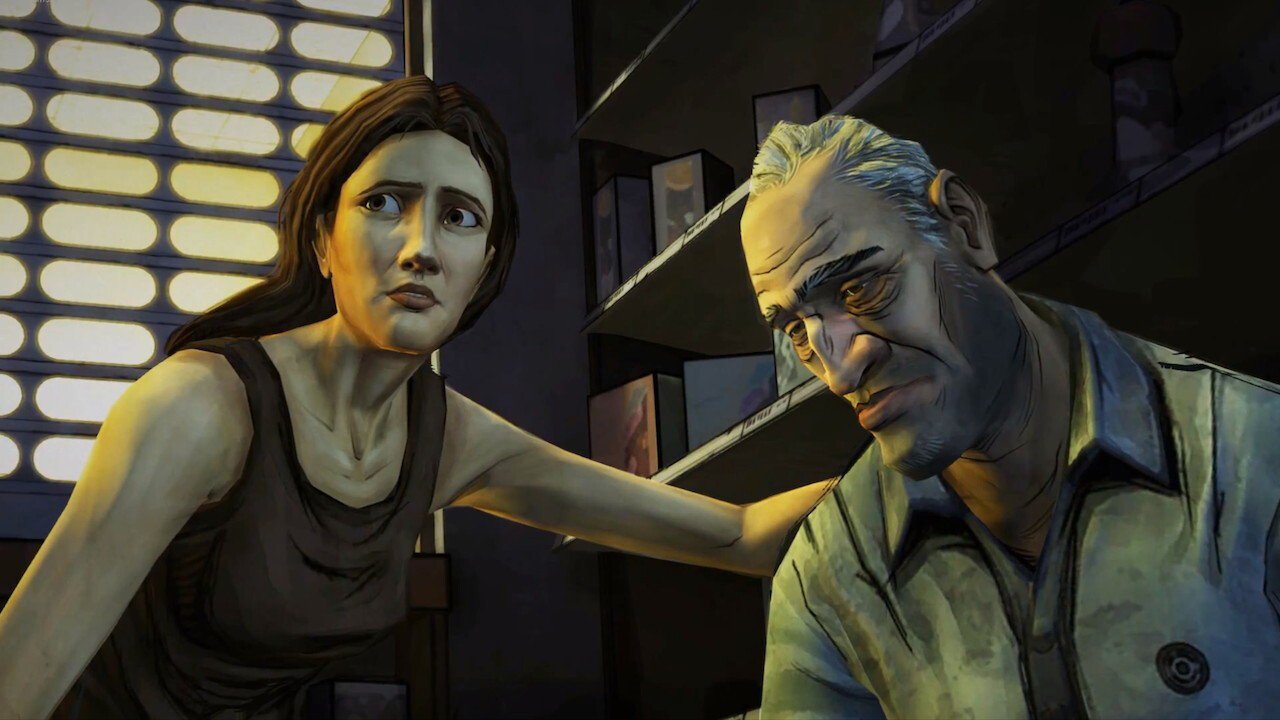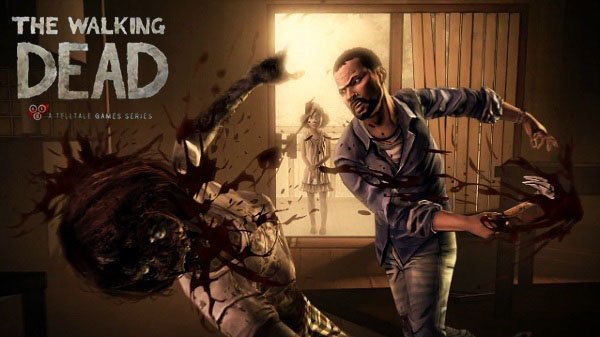Robert Kirkman Is A Proud Man
When it comes to translating a comic into a game, most properties have had a bad time of it. In recent years, there have been only two IPs that have made the transition with great success. Rocksteady’s Batman series, and The Darkness as stewarded by first Starbreeze, and now Digital Extremes. We can now add a third name to that list, as Robert Kirkman’s fantastic The Walking Dead makes the jump from the pages of Image Comics to the television, and finally consoles and PCs. Despite its transmedia hopping though, there’s no question this game is aimed squarely at the comic fans.
Bleak Adventure For The 21
Century
Adventure games have been on an undeniable market decline since their heyday in the 90s. The old point-and-click mechanics so beloved by Sierra-Online and Lucas Arts fans has fallen out of favor with most gamers, and more importantly, most publishers. Development studio Telltale has been one of the few bright lights in an otherwise dim genre, managing to survive and carve a healthy niche for itself by seizing upon, and successfully executing, the notion of episodic content, something even the mighty Valve was unable to do. While they started out playing it safe and tackling the franchises and format people know best—ie, Sam & Max, Monkey Island and traditional point-and-click interfaces—they’ve been experimenting with the mechanics of the genre in recent years. They’ve branched out to big, licensed names, like taking on Back to the Future and made some bold design choices with Jurassic Park which, while interesting, ultimately failed in their attempt to combine traditional adventure mechanics QTE sequences.
However, with A New Day, the first of a five “episode” series based on The Walking Dead, it seems like Telltale has finally got a successful experiment on their hands. The story—officially blessed by Robert Kirkman himself as canon with his comics—centers on Lee Everett, a convict on his way out of Atlanta, headed for prison when the Zombie Apocalypse hits. Over the course of this first episode, cameos from comic characters are doled out for fans to squee over, and it’s obvious from the combination of bleak situations and high friction dialog that writer and designer Sean Vanaman “gets” The Walking Dead. He understands the essential components of its success as a comic, and incorporates that into this game, rather than trying to make a shooter and then fruitlessly graft those elements on after the fact. The Walking Dead has always been a story about survival and human tension, not high octane combat thrills and clichéd relationships. The New Day reflects all this.
Getting into more technical matters, we see the Telltale engine once again in action, but pushed in a slightly different direction. Up until now, the arc of the Telltale engine’s use has been a predictable one; the simple polygons of Sam & Max or Monkey Island eventually graduating to something a bit more realistic with Jurassic Park. The New Day goes lateral, with a more detailed look than Sam & Max that is offset by its visibly stylistic, illustrated, comic book aesthetic. Intentional or not, this seems to have also resulted in some fairly stable performance, with even the finicky PS3 only showing some occasional stutter in more hectic scenes, compared to regular, significant frame rate drops Jurassic Park experienced on the same console. The only time the game really stumbles is in the character modeling department; careful observers will note the same zombies crawling around over and over again, though this doesn’t actually detract from the experience.
The sound side of things is equally—if not more—powerful, with some restrained, credible acting from everyone. Dave Fennoy as protagonist Lee Everett, and Melissa Hutchison as his child ward Clementine in particular, contribute stand out performances that are essential to sucking the audience in. In fairness to the rest of the crew, there’s not a single cast member that actually delivers as weak piece of dialog, but Lee and Clementine are the core that need to hold this game together and the actors are up to the task. Performance-wise, Telltale has created a cast that is every bit the equal of the Mass Effect or Dragon Age cast members in terms of performance quality. The music, in keeping with the tone of the game, is low key, mostly restrained, with a bit of a folksy quality to it here and there. Like the comic, the game starts out as a story of the southern USA, with greater Atlanta area as the starting point and the occasionally twangy quality of the music is consistent with that feel. The sound effects, as to be expected from a zombie game, do an appropriate job of being “squishy” when required, or, for a more visceral response, bone crunching.
A New Way To Point & Click
All of A New Day’s technical qualities come together for one of the most mature—and gory—titles to release this year. They’ve also congealed into one of the most interesting evolutions of the genre in recent years. Traditional point-and-click mechanics have lost interest with the audience at large because of their static screens and “pixel hunting” nature. Added to this was that solving convoluted puzzles was often more a matter of simply clicking on everything on every screen and then trying every possible combination of item in your inventory to brute force your way into a solution if the puzzle logic was too obscure. Telltale tried to alleviate this by adding quick time events to Jurassic Park, essentially turning action sequences into puzzles as well. Unfortunately the rapid nature of the action sequences combined with a “die and try again” mechanic didn’t enhance the gaming experience, so much as create fast, frustrating puzzles with timers. Telltale went back to the drawing board with A New Day and has a much more balanced and interesting system at play here, possibly helped by the fact that these aren’t lightning fast raptors out to kill the player, but relentless, slow, shambling undead.
Movement can be accomplished with both mouse and controller, though surprisingly, console controllers feel like the more natural interface. The left analog stick controls Lee’s movements, while the right controls the targeting reticle, highlighting objects and/or people that can be interacted with. One nice consideration for a more comic/cinematic effect is the effort spent in giving a variety of dramatic camera angles to frequently switch to, even within smaller, confined spaces. There’s still traditional adventure game puzzles involved here, but Telltale has done away with the typical process-of-elimination solving methodology. Players no longer have to grab every single thing they see, suspecting that the seemingly useless pocket lint at the beginning of the game might come in useful at the half-way point. Puzzle items and solutions are confined to the same area, and show logic that is more common sense than convoluted. Dialog is now also important, taking a cue from RPGs like Mass Effect, as characters remember your responses, and will act according to whether they like or dislike you. An added wrinkle is that responses are now on a timer; players don’t have the luxury of pondering consequences. These choices are designed to carry on into the future episodes, so players should be mindful about long term consequences when deciding who lives, who dies, who gets respect or insulted.
However, the biggest improvement has to be the clever way that Telltale has incorporated action into the adventure genre. Rather than the simple timed, specific button presses that are the norm for quick time events, Telltale has worked in slightly slower, more interactive mechanics. For example, moving the reticle over a zombie shambling towards Lee calls for centering the reticle on said zombie’s face, thus lighting the reticle up to “Hit X to boot zombie in face.” This is nowhere near as quick and punishing as the “blink and you miss it” mechanics of the past, and gives players who weren’t expecting to be suddenly thrust into a QTE time to realize what’s going on and respond. These QTEs run the gamut from fleeing the undead to melee combat against them. It should also be noted at this point that this is definitely not a game for the squeamish. Aside from the occasional profanity, A New Day earns its M rating with a full on portrayal of decaying corpses (missing jaws, torn flesh, etc) and brutal violence. When all you’ve got to defend yourself with against a cannibalistic zombie is an axe, you know it’s not going to be pretty. These QTEs don’t shy away from that in the least, with unflinching blood and decapitation.
In the end the biggest compliment that I can give to The Walking Dead: A New Day is that it more closely encapsulates the spirit of its source material more than any other comic adapted into a game. The Walking Dead is acclaimed by both critics and readers alike for showing the lengths people will go to in order to survive, and how those lengths can cause people to lose touch with their humanity. It chronicles the struggle to retain decency and civilization in a world where the living are endangered and the undead are the dominant species. It’s not about horror for its own sake, but rather the horror that comes from survival, and it shows how in a world full of the dead, it is the living that still present the greatest threat—and hope—to each other. A New Day in this short, introductory first episode manages to encapsulate all of that. If Telltale manages to maintain this level of quality in the remaining four episodes, they will have easily created a new award winning adventure game that can sit comfortably among the giants of the genre like The Longest Journey and Grim Fandango. It’s too early to tell, since there’s still four months of episodes to experience, but the promise is there.






